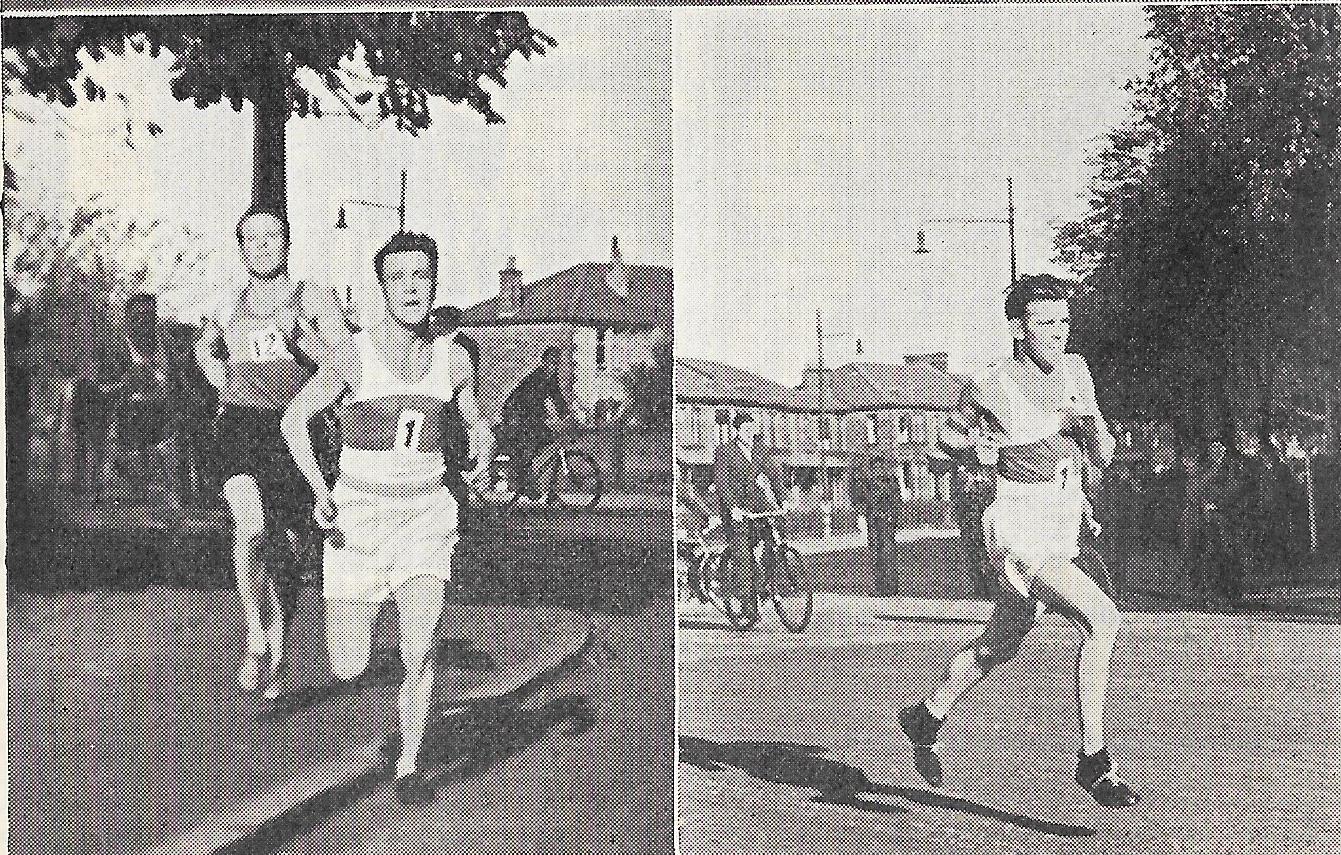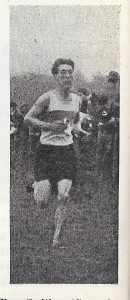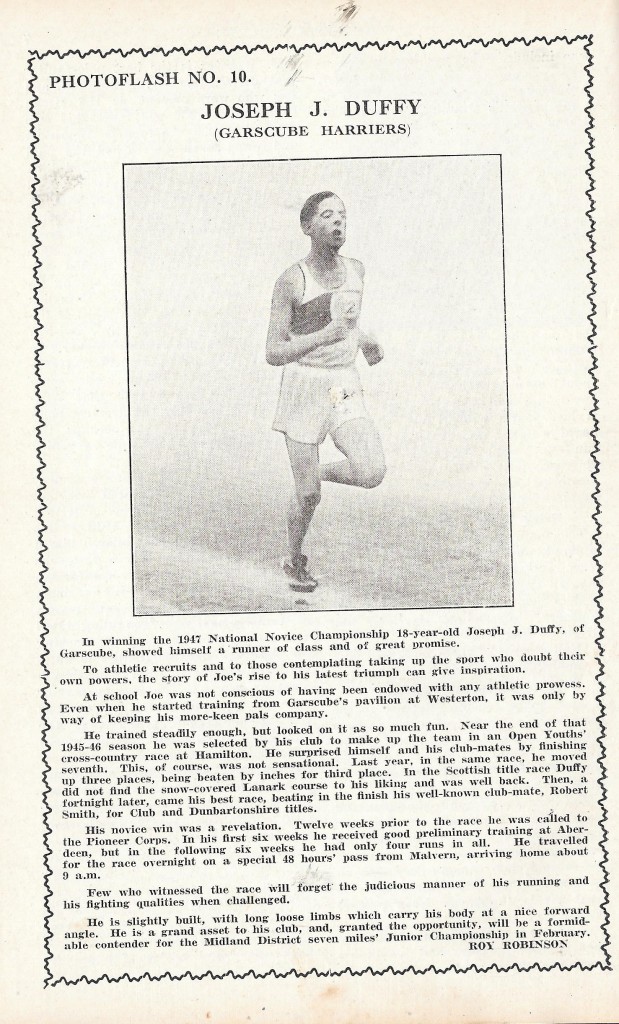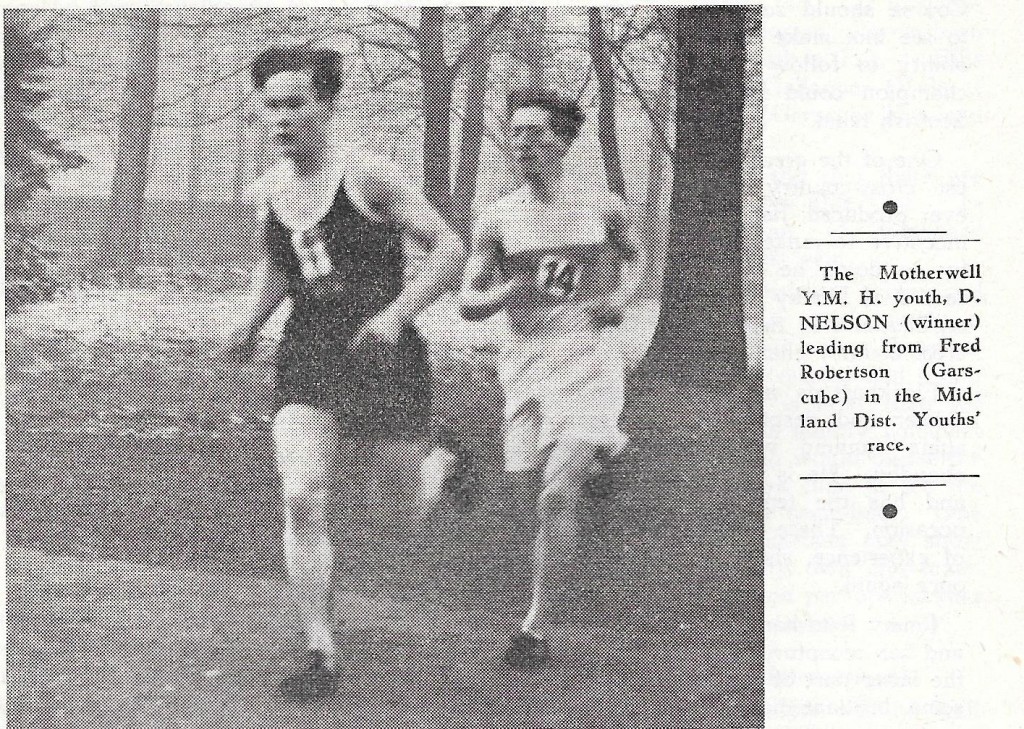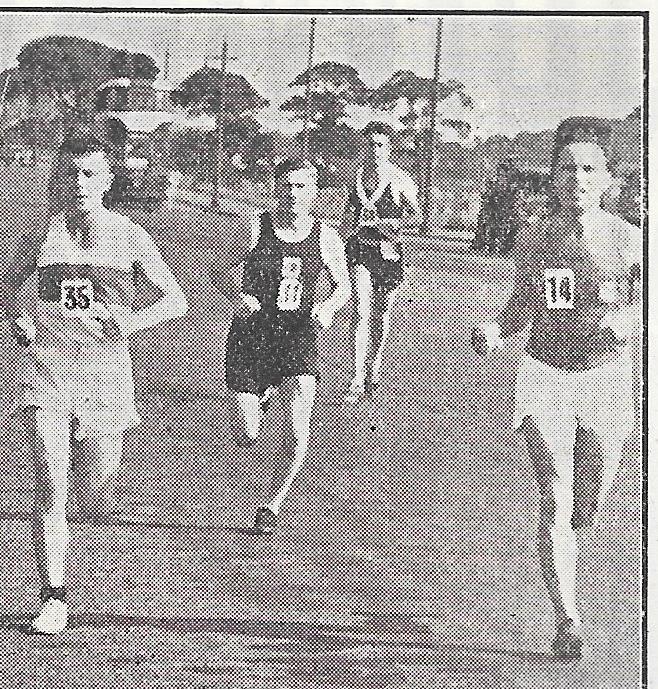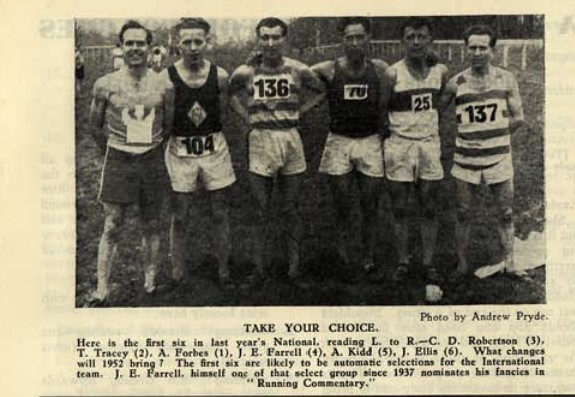Alex Kidd and Arthur Warton
At a time when Scottish athletics was at a high level, Garscube Harriers was among the best in the land. After the war, Maryhill Harriers was still a very good club, Shettleston Harriers, Bellahouston Harriers, and (between 1949 and 1959) Victoria Park (especially on the road) were all operating on an elevated plateau. The club from Westerton was not far behind. The period from 1946 to 1952 illustrates the club’s progress as an endurance running club at that time.
The ‘Scots Athlete’ magazine, founded and carried on at his own expense by Garscube Harrier Walter Ross, chronicled the period in question in some detail. With championships in short supply, the magazine had started a Scottish athletics league with club positions based on places gained by individual club members in open meetings, including works sports, highland games, etc. By the middle of the 1946 season with 42 clubs taking part, Garscube Harriers was second behind Victoria Park. At the end of August 1946 one of the men who woulf feature in the coming cross country season was in the news: Arthur Warton won two races in four days when he won the Mile at Milngavie on the Saturday and then another at Helenvale on the following Tuesday in the Transport Sports. He was not the only club man doing well though with Robin Sharp being in the results every other week for a good performance in the sprints, and on the roads Alex Gold was finishing high up the field in most races (eg 6th in the Perth to Dundee). The club trainer at this time was John McFadden and he is pictured on the cover of the October 1946 issue of The Scots Athlete along with Warton and Sharp in a photo taken at Cowal Highland Games under the title @Some of Scotland’s Finest’.
The winter started as ever with the McAndrew Relays and although the club had good runners, they suffered because of the lack of depth at that time. Emmet Farrell in his ‘Running Commentary’ in the November issue of the magazine said –
“Garscube with F Jewell off through injury, and A Warton obviously not tuned up were a shadow of their former selves and as they have not the latent strength of Shettleston, their racing prospects are uncertain but they remain the usual exuberant bunch of sportsmen. They have lost Albert Hay, now in Canada, but in R Smith, D Murray and J Small they have promising runners, who along with R Mulgrew, who may find some form, and Alex Kidd, an international potential, likely to be demobbed soon, can maintain Garscube standard.”
The Western Track League final placings were revealed in November and top was Victoria Park with 109 points, Glasgow Police were second with 86 points, Garscube third with 84 and Shettleston fourth with 67 points, followed by Maryhill and Bellahouston. The top 33 clubs were listed. It had been a good summer season. But we were in the cross-country season and the first championship after the relays was the National Novice championship and Garscube runner R Smith finished fourth and the team was seventh of the 15 complete teams to finish. Clydesdale Harriers Youth Ballot Team Race took place for the first time in November and Garscube’s JJ Duffy finished fourth again. Arthur Warton was written up as a contender for the Midland District championship but the January, 1947, ‘By The Way ..’ column had comments on two of the club’s runners. First:
“Alex Kidd, home on leave and expecting demob in a few weeks time, was converted to running because of his enthusiasm for boxing. He wanted to put in extra training nights for the Amateur Boxing Championships and so he started training with the Garscube lads from Westerton in his desire to build up his stamina. He enjoyed the runs and was tempted out in a 6 miles cross-country handicap. His first race was a revelation – finished second off the novice mark from a fairly large entry. From that date as far as Alex was concerned, running was ‘leading on points’ before he finally gave boxing the ‘knockout’. In the SCCA test at Motherwell in 1945 Alex was a good third to Emmet Farrell and Harry Howard. At 22 years of age, Alex Kidd will add keenness and colour to Scottish athletics.”
and
“And who would imagine that Alec Hay, joint champion with brother Albert of Garscube, and runner-up this year in Scottish 3 mile track championship, with his heavy stride and almost cumbersome style, is a very beautiful and graceful Highland dancer and has many classes in and around Inverness? ‘Sandy’ is training to defend his title again this year and, no doubt, will have a bid for international honours, which he narrowly failed to achieve last year.”
The Garscube team was coming together – Warton and Kidd would be fixtures for decades to come and Hay did indeed finish second in the SAAA 3 Miles championship in 1946, the race being won by Emmet Farrell with AT Peters of Maryhill third. In the Midlands District Junior and Youth Championships, the Juniors were in sixth place but the Youth team led by R Smith in second place and Joe Duffy in fourth, was second equal with Maryhill in the race won by Victoria Park. There was a letter from their former member Bert Hay in the ‘Scots Athlete’ giving an update on his progress in Canada where he ran for Gladstone AC. He reported that in a 5 mile road recently in which he was fourth he received a 17 jewel wrist watch, and he followed that up with a victory in an eight mile road race in 44 minutes.
Hay ran well in the national – taking the lead during the second lap he led all the way to the end of the third lap but dropped five places in the second lap and fell back to finish fifteenth. This was a very good field indeed with the first half dozen being Andy Forbes, Alex McGregor, Emmet Farrell, Frank Sinclair, Willie Somerville and J Reid. The other Garscube men were Mulgrew 24th, AL Hay 29th, DB Brookes 37th, J Gunn 54 and Walter Ross 55th.
The promise of the Under 17 group of Garscube Harriers was seen whe they finished first (JJ Duffy), second (R Smith) and third (F Russell) in the Dunbartonshire Cross-Country Championship for Youths on 29th March at their home trail at Westerton. Then came the Round Dundee relay which they had won the inaugural race in 1943 and were first to finish in 1944 although the race was declared void after a stewarding error. The team did well enough in 1947 to be third: Alex Kidd was fifth on the first stage, AL Hay moved up to third on the second, T Dailly brought them up to third on the next leg and R Smith held it on the final stretch.
R Smith
Looking ahead to the SAAA Championships, Emmet Farrell rated Sharp a good contender for the quarter mile and Warton had ‘proved himself no slouch’ over the half mile. Unfortunately he had to report that F Jewell of Garscube was in England and could not run in the championships. As for the longer races, A Hay was able to make an interesting start but unfortunately for Farrell, Hay always peters out! R Smith was the previous year’s runner up in the Junior mile was also mentioned in the context of the junior championships. When it came to the bit, though, only Sharp picked up a medal in the National Championships when he was second in the 440 yards. However two weeks earlier at the Babcock & Wilcox Sports at Renfrew, the club won the Empire Exhibition Trophy for the best team at the meeting – a hotly contested trophy for several decades. In the SAAA Junior Championships, R Smith went one better and won the Mile in 4:45.0 and the report read: “The favourite for the mile, however, long striding DRB Grubb (Geo Heriots School), already holder of the Scottish Schools title, could not meet the challenge of R Smith of Garscube Harriers whose strong finishing burst took him to the tape in 4 min 45 sec, and excellent performance on this track.”
In the McAndrew Relay at the start of the 1947/48 winter season, Alex Kidd lef the field home on the first stage, Arthur Warton was second at the end of the second stage and D Murray was third at the end of the third stage. On the last stage veteran T Dailly had dropped another single place to see the club finish in fourth and out of the medals – it had nevertheless been a good start to the winter and proof, if any were needed, that in Kidd and Warton, the club had two very good seniors. In the Midlands District Relay, the first after the War, the club finished third with a team of D Murray (13:38), A Warton (13:43), A Kidd (12:58) and T Dailly (13:27) and the club B team was eleventh. Kidd was third fastest over the course, faster than Andy Forbes and Emmet Farrell and several other very good athletes. The next championship was the national novice championship and Joe Duffy of Garscube won the race with the club in sixth position of the 27 competing teams. The Photoflash article in the Scots Athlete was on Joe Duffy (Robin Sharp having been covered earlier in the year) .
Coming up to the National, Alex Kidd was mentioned as a contender for a place in the international team. BNefore then of course came the Midland District Championships and although there was no one in the first three (the race was won by Bobby Boyd of Clydesdale Harriers from Walter Lennie, Vale of Leven and George Craig of Shettleston) Kidd in fourth place led the club to a great team victory. They had a total of 74 points from Maryhill’s 110 and Shettleston’s 130. The counting runners for Garscube were Alex Kidd 4th, Arthur Warton 5th, RJ Mulgrew 10th, T McGinley 11th, J Gunn 15th and D Murray 29th. There were eleven Garscube Harriers who faced the starter that day and all finished. In the Youths race, the team was led home by Ewan Murray in eighth place and Hugh Hatrick in eleventh to finish seventh. In the 1948 national with Shettleston and Bellahouston back to full strength, Garscube was third team – Kidd 10th, Mulgrew 13th, Warton 19th, McGinley 24th, Murray 28th and J Croall 56th. Walter Ross and Davie Causon also ran finishing 64th and 74th respectively. The Youths team were unfortunate in that they only finished fourth – W Munro 11th, H Hatrick 12th, E Murray 26th and J Linn 59th. W Murray was 80th. It had been a good day and ended a very good season with team medals in relays, and championships all the way from County to District to National. But still no international representation over the country.
Winter 1948/49 started on 3rd October when a depleted team finished fifth in the McAndrew relay at Scotstoun: fastest man was D Smith, two seconds faster than Alex Kidd on legs two and three. Four teams were run that afternoon with the B, C and D teams finishing 17th, 31st and 32nd.
In the Clydesdale Harriers Youth Ballot Team Race, first Garscube man home was F Robertson in third place with Ewan Murray in tenth. In the Midland Relays at Stirling on 4th December, Alex Kidd was third on the first stage in a time of 19:18 but the next three men – McGinley, Mulgrew and Gunn – all ran exactly the same time of 15:59 which dropped the club down to ninth.
The team turned out by the club for the Midlands District Championship was far from the club’s best. TA Gourley was 48th, experienced road runner Alex Gold 50th, David Causon 59th, P McGrath 62nd, W Robertson 80th and J Andrews 82nd. Other runners included R Smith 83rd, J McGarrity 84th, I Edwards 92nd, WJ Ross 96th, A Veitch 99th and J Croall 115th. The team was down in eighth place. The youngsters were more successful with F Robertson second and the team also finishing second. However by the time of the national, a few of the stalwarts were again available and first man home was Alex Kidd in 9th place, followed by J Gunn 26th, T McGinlay 40th, T Dailly 444th, J Mulgrew 48th and J Andrews 56th. Just out of the medals, but again the Under 17’s improved on that. With no one in the first three or four, they were a very close second, beaten by only two points. Runners were ES Murray 8th, G Dunn 17th, FJ Robertson 18th and W Munro 28th.
Emmet Farrell reported enthusiastically on the AAA’s marathon and waxed enthusiastic over Garscube runner Eddie Farrell’s 11th place, commenting: “Garscube Harrier Eddie Farrell finished 11th of the 75 starters and considering the fact that the field was a considerably good one, his performance rates even better than its face value. Despite taking up racing rather late in his career and being now in the veteran stage, the Garscube man is the type that can stay forever. He sets a steady pace and maintains it to the finish. If he cared to attempt a more ambitious schedule I believe that he could be placed in the Scottish Marathon Championship”.
The Edinburgh to Glasgow Relay race was held on 25th April in 1949 and Garscube had a bit of an up-and-down performance. Joe Duffy on the first stage was eighth but Alex Kidd on the tough second leg moved up to third with second fastest time of the day for the six miles. Fred Robertson pulled up another place and handed over in second. D Murray on the fourth stage dropped back, but only one place to third. D Murray kept that position on the fourth stage to half distance. J Andrews dropped one more place to fourth on the exposed fifth leg and then on the longest stage of the race, J Gunn dropped to seventh – it should be pointed out that he was racing some of the top men in the country and was passed by three international athletes. R Black managed to pull one back and at the start of the last stage the club was sixth. The gap to the third team of 3+ minutes was too big for T Dailly who held on to sixth place.
On 1st October 1949, the club was sixth in the McAndrew Relay. This was actually a good performance at a time when the standard of Scottish distance running was high. The team was R Smith, R Black, JJ Duffy and A Kidd who was fastest club man again. On 15th October it was time for the Dunbartonshire County Championship relay and the club’s two teams were third and fourth. The Edinburgh to Glasgow had its second running of 1949 on 21st October and the club started out with Hugh Hatrick finishing 12th on the first stage. Alex Kidd, again on the second stage, moved up four places to eighth but John Gunn could not hold that and dropped down to tenth. Fred Robertson came next and picked up one [place, handing over in ninth to AW Watson who made his way up to eighth place. Joe Duffy dropped only one place to ninth on the seven mile leg, R Black held it on the seventh stage and R Smith ran home in ninth position. In the Midland Relay Championship the club team of Hatrick, Smith, Kidd and Robertson was eleventh. Eddie Farrell had disappeared from the scene but reappeared at the start of 1950 in the Helensburgh to Clydebank 16 miles road race (later to become the Clydebank to Helensburgh) when he finished 15th, one place and 36 seconds behind Walter Ross in a field of 21. The Midland District Championships were held at Motherwell on 4th February, 1950, and Garscube finished eighth. Ironically for a club that had formerly got results by packing well, Alex Kidd was ninth and then there was a huge gap to J Gunn in 46th, then Mulgrew 84th and Ross 86th. The national was on 4th March at Hamilton and again Alex Kidd was the top Garscube man. He finished 20th with J Gunn again second club runner back in 68th with Alex Gold in 71st. The team was ninth. It must have been a frustrating time for the club – they had runners in big numbers but they were not turning out in the races that counted. Young runners were coming through and not adding to the strength of the team. The Junior team was also ninth with Joe Duffy leading them home in 20th with Fred Robertson 27th, R Smith 43rd and H Hatrick 44th. There was no team or individual entered in the Youths race.
In summer 1950 several club men ran on the roads – Walter Ross, Normal Ross, TJ McGinley and TF Barton, with McGinley’s performances good enough to see him ranked number 8 in Scotland for the year. But when the winter came. they were all out. First race was the McAndrew relay and the club was fifth with the runners being Russell, Duffy, Coupland and Kidd with other teams placed 27th and 34th. On 21st October at Jamestown, the Dunbartonshire relays were held and Garscube won with teams also finishing fourth and fifth. Alex Kidd was second fastest on the day and the team was again made up of Russell, Duffy, Coupland and Kidd. On 4th November the Midland District relay was held at Stepps, and the team was sixth and had the same four runners on the same stages as in the two previous races. B and C teams were 21st and 25th with the name of A Warton reappearing for the third team – not much slower in time than two of the first team either.
18th November, 1950 saw the Edinburgh to Glasgow on the week end which was to become its due date for decades to come and Garscube chose to start wit Coupland on the first stage. He finished eighth and handed over to Joe Duffy who dropped three places to eleventh. Arthur Warton was next up and he picked up three places to have the team back in eighth. J Gunn maintained eighth, but Fred Robertson had a really bad run and dropped back to sixteenth. Alex Kidd could do no better than hold the position on the seven miles of the sixth stage, F Russell brought them up to 13th and R Smith came up two more places to have the club finish 11th.
On 6th January, 1951, the Dunbartonshire county championships were held and Garscube won the team race with the counting runners being Alex Kidd third, Gordon Dunn fourth, D Coupland fifth and J Gunn sixth. Wonderful packing. In the Youths race, H Carson was second and the team was also second with the other runners being G Dixon 4th and P Walkie 5th.
In the Midland Championships at the start of February, Garscube was fourth with Alex Kidd leading them home. He was 11th with J Gunn in 28th, A Warton 34th, JJ Duffy 38th, D Coupland 53rd, and NM Ross 69th.
City of Edinburgh Marathon: Alex Kidd, Andy Brown, J Kelly, Emmet Farrell
Being written up by Emmet Farrell as a contender for a place in the international team was often the kiss of death for the athlete’s chances, but after sever years of such treatment, Alex Kidd made the top eight in the national. Kidd ran ‘possibly his best ever race, full of verve and determination’. He finished fifth but fourth for the purposes of the team race. The other Garscube runners who helped take the team into sixth place were J Gunn (30), J Duffy (38), A Warton (42), D Coupland (51) and A Gold (57). They had no team in the Junior race but G Dunn was 20th and J McDonald 65th. Alex was picked for the International in Caerleon, Wales, but finished 55th – six places behind Eddie Bannon and four behind Charlie Robertson – and out of the counting six.
Alex Kidd then took to the roads over the longer distances and on 25th August ran in the Perth to Dundee race where he finished fifth of the 17 runners in 2:08:41 for the 22 miles. In the City of Edinburgh marathon he finished fifth, one place in front of Joe McGhee, in 2:47:39.
The winter of 1951/52 started with the McAndrew Relay and Garscube was eighth with a quartet of Coupland, Duffy, Russell and Kidd. With a slightly changed foursome of Coupland, Kidd, Dunn and Duffy they were seventh in the Midlands Relay but the surprise was that Duffy ran six seconds faster than Kidd. The second team of Jewell, Gunn, Carson and Warton was 19th. In the Dunbartonshire championships the team was second to Clydesdale Harriers (who also provided the third team) with Coupland, Duffy, Dunn and Kidd. On to the Edinburgh to Glasgow relay and the team runners and positions were Coupland 11th, Kidd 7th, R Bell 7th, Dunn 11th, Gunn 9th, Duffy 9th, Black 8th and Russell 8th. It cannot be said often enough that the standard at this point was very high – yes, VPAAC, Shettleston and Bellahouston tended to be the top teams but snapping at their heels were Springburn, Garscube, Edinburgh Southern and Greenock Glenpark. It was not enough to have five or even six good men for the E-G or the Midlands or National championships. The clubs needed eight – even for races where only six counters were required because there was always somebody injured or having an off day and the other clubs would pounce on that weakness.
With the Inter Counties Cross-Country Championship at Westerton on 12th January, the Garscube runners were not out in the Nigel Barge Road Race seven days earlier. Alex Kidd was the first Dunbartonshire man to cross the line when he was fourth. D Coupland was 12thm R Black 16th and Robertson 18th. There was a serious rivalry at the time between Kidd and Vale of Leven AAC’s Willie Gallacher and although the latter won in the County Championship, both were inside the old course record. The Midland championship was on 2nd February and a weak Garscube squad finished ninth – again Kidd was the main man being 13th but it should be borne in mind that, as a result of his war service, Kidd suffered from malaria and it affected him from time to time. There was the story of the runners returning to the dressing room in Lenzie and finding him lying shivering on the bench: apparently he told them not to worry, it was only the malaria! Several runners also had malaria after the war – the old joke about the man going home from training to take his quinine being corrected by his clubmates who said it was Queen Anne (whisky) that he was going to have, had a bit of truth in it. Nevertheless, Kidd was only 13th at Lenzie in 1952 and there were three scoring athletes outside the first 80.
First six in National: Scots Athlete, p5, Feb 1952
The National was held, as was the custom, at Hamilton on 1st March and the Garscube team, while stronger than at Lenzie a month earlier was eighth. Runners were Kidd 17th, Black 33rd, Coupland 38th, NM Ross 60th, TA Gourley 62nd and A Gold 64th. They had no one in the Junior race but the Youths team was ninth.
This was to be the pattern for several years to come with very good runners such as Stan Horn running in the blue and white in championships and major races without ever winning more medals at national level. But make no mistake, there was some seriously good running by club men at this time.
